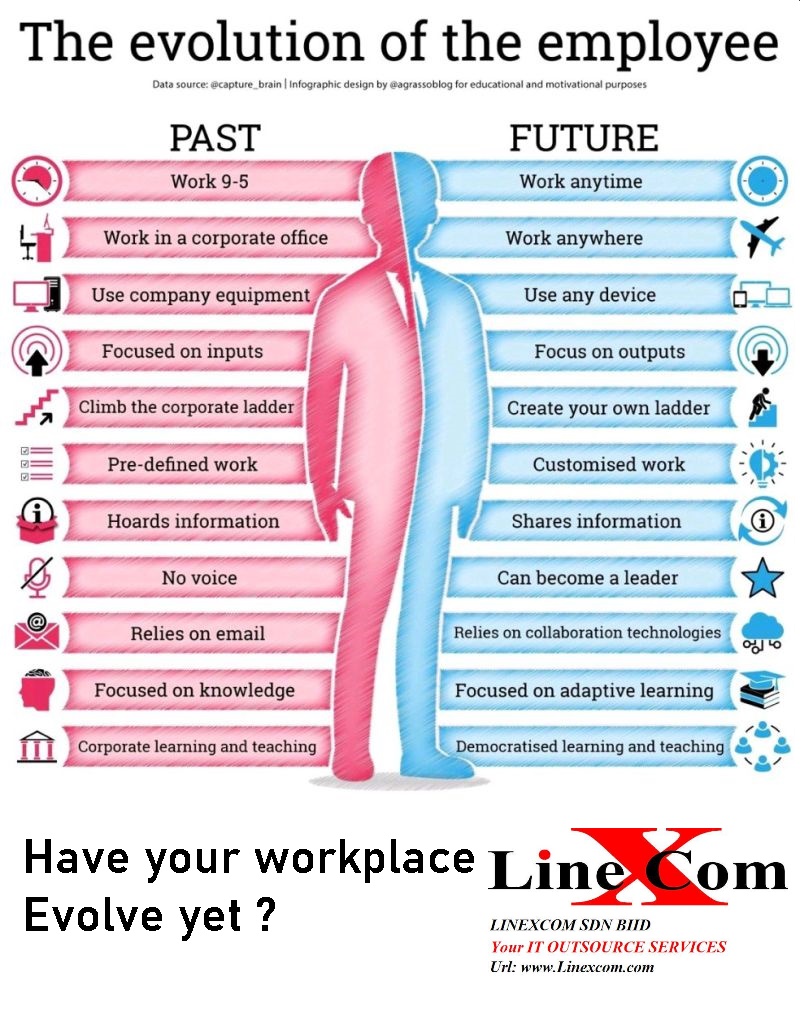**The Future of Work: Embracing Change**
*Adapting to a Shifting Work Landscape*
In the modern business world, the workplace is experiencing a significant transformation. This evolution is driven by technological advancements and a fundamental shift in organizational ideologies. Let’s delve into the critical elements of this ongoing change, focusing on adaptability, collaboration, and individual empowerment.
**1. Flexible Work Arrangements: Anytime, Anywhere, Output-Driven**
*Breaking Free from Conventional Office Structures*
Traditional work setups are making way for more flexible arrangements. Employees are no longer tethered to physical office spaces or rigid 9-5 schedules. Instead, the focus has shifted from hours worked to the results delivered. Forward-thinking companies, including Unilever, Aetna, and American Express, are leading the charge in championing this concept, allowing employees to work on their terms.
**2. Device Freedom: The Power of Choice**
*The Era of Personal Device Usage*
Company-issued phones and computers are becoming a thing of the past. The future employee enjoys the liberty to select any device that suits their needs to fulfill work tasks. Visionary organizations like Ford, IBM, and Intel are at the forefront of this movement, permitting employees to utilize their personal devices for work-related activities.
**3. Personalized Career Pathways: Shaping Your Own Journey**
*Moving Beyond Traditional Career Ladders*
The conventional career ladder is undergoing a transformation into a personalized career journey. Rather than being confined to a predefined linear path within an organization, employees are taking control of their careers. Programs like Deloitte’s Mass Career Customization empower employees to adapt their work preferences, including making lateral moves or managing their travel commitments. Other companies, such as Valve and Treehouse, empower employees to independently select projects and collaborators.
**4. Knowledge Sharing: From Isolation to Collaboration**
*Fostering a Culture of Information Exchange*
In the past, employees often hoarded information, perceiving it as a source of power. However, the modern workplace encourages knowledge sharing. Collaboration platforms have created an environment where employees are incentivized to share their ideas and insights. Email, once the primary communication method, is shifting to more open and collaborative approaches.
**5. Unleashing Leaders: Anyone Can Lead**
*Democratizing Leadership Opportunities*
The contemporary workplace democratizes leadership. Collaboration technologies provide every employee with a platform to become a recognized leader by sharing ideas, thoughts, and content within the organization. This represents a significant departure from the past when leadership roles were confined to a select few.
**6. Adaptive Learning: The Currency of Tomorrow**
*Evolving from Static Knowledge to Continuous Learning*
Access to knowledge has become readily available through technology. The future employee’s value lies in their ability to learn continuously and apply that learning to new situations. Adaptability and the capacity to learn how to learn are more valuable than static knowledge.
**7. Democratized Learning and Teaching: Empowering Knowledge Accessibility**
*Learning Beyond Boundaries*
Collaboration platforms and online resources have democratized learning and teaching. Employees can now create and share instructional content, facilitating self-paced, on-demand learning. Platforms like Udemy, Coursera, and Khan Academy offer expansive educational opportunities.
The workplace is in the midst of a transformative journey, with adaptability, collaboration, and individual empowerment serving as key drivers. Embracing these changes can enable both organizations and employees to thrive in this ever-evolving landscape.
So have your workplace evolve yet?
